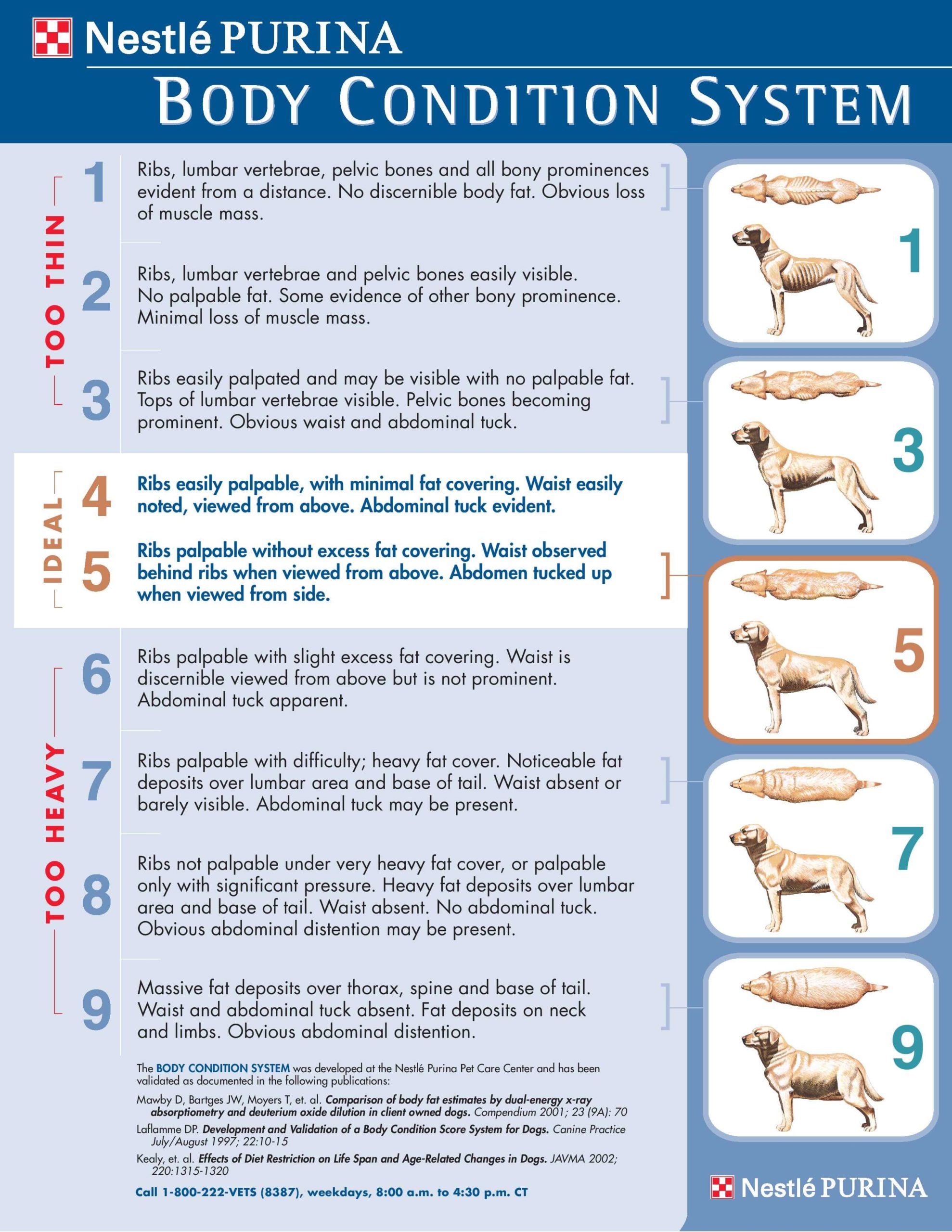Weight Management
Check out more information below on how to keep your pet’s weight at a healthy level and extend their life.

Don’t blame your pets! They don’t do the grocery shopping!
What is your pet’s BCS and why should you care?
Overweight and/or obese pets will have more health issues such as joint issues, respiratory difficulties, diabetes, and a variety of other medical issues. Research has shown that pets that are normal weight (not overweight or obese) on average live 2 years longer than overweight pets.
Obesity is defined as the excessive accumulation of body fat. In the U.S., over half of dogs and cats are overweight. The primary causes of obesity are overeating and lack of exercise. When regular caloric intake exceeds the energy burned, the excess is stored as fat.
As little as an extra 1 percent caloric intake can result in a 25 percent increase over ideal body weight by middle age.
Most owners don’t recognize that their dogs are overweight until they take them to the veterinarian for another reason. Most pets begin slowly gaining weight and only a historical review of body weight reveals the insidious nature of this condition.
I see four basic reasons for DOGS being overweight:
- Too many treats, snacks, and/or table food
- Too much food
- Not enough exercise
- Disease (such as hypothyroidism)
CATS are usually due to too much food!
Consider This
There are formulas for resting energy requirements for dogs and cats that help us determine the number of calories your pet needs. Even with this help, we still have to look at your pet’s individual lifestyle and metabolic rate. Consider this: humans generally require 2000-2200 calories per day. A pet that requires 400 calories per day (about 1/5 of most humans). Giving this pet 1 slice of cheese is the same as you eating 5 slices of cheese – all in addition to what has already been fed.
Home Care
Weight loss should be a family effort. All members of the family must admit that your pet is overweight and commit to a weight loss program. It may be helpful to maintain a log of intake (food and treats) and weight to monitor progress. It might be most effective if one person takes charge of feeding your dog, but all members can help exercise him. Re-check visits are essential every 4 to 6 weeks to monitor your pet’s weight loss since adjustments to the feeding plan are often needed. As your dog approaches ideal body weight, caloric intake must be reduced further to maintain weight loss. You are always welcome and encouraged to come to the clinic for a weigh in. Make sure you tell us what the weight is so that we may document your pet’s weight. To achieve significant weight loss, the diet may need to be changed to a therapeutic veterinary diet specifically designed for weight loss. Simply feeding less of your pet’s regular food is rarely, if ever, successful. You must be willing to measure exactly the amount of food offered and minimize treats. If treats are necessary, offer low calorie snacks such as Royal Canin Treats or air popped popcorn or a piece of vegetable (such as a carrot or green beans).
What Happens When You Are Doing Everything We Have Recommended
and Your Pet is Still Gaining Weight
We will want to determine the cause of your dog’s obesity before deciding upon treatment. Diagnostic tests that we may wish to perform include:
- A thorough physical examination, including an accurate measure of body weight and an assessment of body condition score.
- Assessment of your dog’s current daily intake of all food, treats, snacks, table foods, and exercise schedule.
- Routine blood work including a complete blood cell count, chemistries – including thyroid tests and urinalysis.
If the results are normal, obesity is probably the result of excessive caloric intake and decreased energy expenditure. However, if the results of these routine tests indicate a potential problem, additional tests are warranted to specifically identify the condition.


